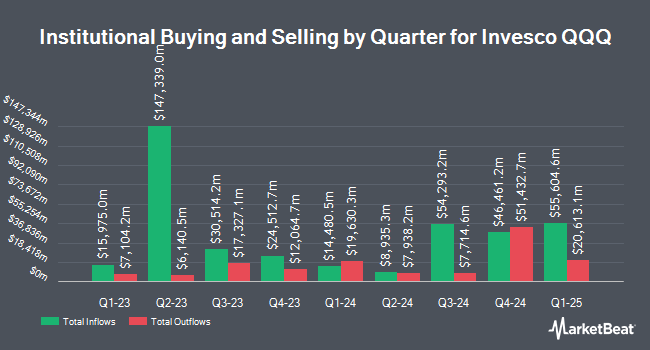WNY Asset Management LLC increased its position in shares of Invesco QQQ (NASDAQ:QQQ - Free Report) by 166.9% during the fourth quarter, according to its most recent filing with the Securities & Exchange Commission. The fund owned 32,315 shares of the exchange traded fund's stock after acquiring an additional 20,207 shares during the period. Invesco QQQ comprises about 2.0% of WNY Asset Management LLC's portfolio, making the stock its 13th biggest position. WNY Asset Management LLC's holdings in Invesco QQQ were worth $16,520,000 at the end of the most recent reporting period.
A number of other hedge funds and other institutional investors have also bought and sold shares of the company. Stephens Consulting LLC lifted its holdings in shares of Invesco QQQ by 0.4% in the 4th quarter. Stephens Consulting LLC now owns 5,416 shares of the exchange traded fund's stock worth $2,769,000 after acquiring an additional 19 shares during the last quarter. Farmers & Merchants Investments Inc. lifted its holdings in shares of Invesco QQQ by 1.9% in the 4th quarter. Farmers & Merchants Investments Inc. now owns 1,093 shares of the exchange traded fund's stock worth $559,000 after acquiring an additional 20 shares during the last quarter. RAM Investment Partners LLC increased its stake in Invesco QQQ by 1.7% during the 4th quarter. RAM Investment Partners LLC now owns 1,167 shares of the exchange traded fund's stock worth $597,000 after buying an additional 20 shares during the period. HighMark Wealth Management LLC increased its stake in Invesco QQQ by 5.2% during the 4th quarter. HighMark Wealth Management LLC now owns 407 shares of the exchange traded fund's stock worth $208,000 after buying an additional 20 shares during the period. Finally, Providence First Trust Co increased its stake in Invesco QQQ by 3.0% during the 4th quarter. Providence First Trust Co now owns 676 shares of the exchange traded fund's stock worth $346,000 after buying an additional 20 shares during the period. Institutional investors own 44.58% of the company's stock.
Invesco QQQ Trading Up 0.3%
QQQ traded up $1.53 during trading hours on Thursday, hitting $520.44. 35,833,216 shares of the company's stock were exchanged, compared to its average volume of 37,483,944. Invesco QQQ has a 12-month low of $402.39 and a 12-month high of $540.81. The firm has a 50 day moving average of $477.01 and a 200 day moving average of $501.03. The firm has a market cap of $326.13 billion, a P/E ratio of 30.62 and a beta of 1.11.
Invesco QQQ Cuts Dividend
The firm also recently announced a dividend, which was paid on Wednesday, April 30th. Investors of record on Monday, March 24th were paid a dividend of $0.7157 per share. The ex-dividend date was Monday, March 24th.
Invesco QQQ Profile
(
Free Report)
PowerShares QQQ Trust, Series 1 is a unit investment trust that issues securities called Nasdaq-100 Index Tracking Stock. The Trust's investment objective is to provide investment results that generally correspond to the price and yield performance of the Nasdaq-100 Index. The Trust provides investors with the opportunity to purchase units of beneficial interest in the Trust representing proportionate undivided interests in the portfolio of securities held by the Trust, which consists of substantially all of the securities, in substantially the same weighting, as the component securities of the Nasdaq-100 Index.
Read More

Before you consider Invesco QQQ, you'll want to hear this.
MarketBeat keeps track of Wall Street's top-rated and best performing research analysts and the stocks they recommend to their clients on a daily basis. MarketBeat has identified the five stocks that top analysts are quietly whispering to their clients to buy now before the broader market catches on... and Invesco QQQ wasn't on the list.
While Invesco QQQ currently has a Hold rating among analysts, top-rated analysts believe these five stocks are better buys.
View The Five Stocks Here
Market downturns give many investors pause, and for good reason. Wondering how to offset this risk? Enter your email address to learn more about using beta to protect your portfolio.
Get This Free Report
Like this article? Share it with a colleague.
Link copied to clipboard.